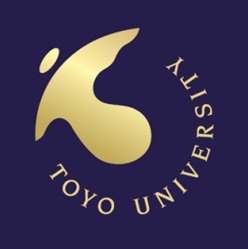Toyo University

Strengths
Inspired by the spirit of its founder, Toyo University aims to produce “globally talented individuals” with the ability to think globally and stay focused,
and create their own future.
To achieve this objective, the University offers an education based on three fundamental principles: the teaching of philosophy, internationalisation and continuing education.
The Toyo University logo (a motif representing “a person” and “the Earth”) symbolises the idea of a student, wings spread, in dynamic flight towards the world. It also represents the development of “global human capital” through philosophically-based internationalisation and professional training, as well as the joy and anticipation of the future that comes from aiming high.
Major, Academics
You will attend classes in English.
To keep your student visa in Japan, you will need to attend at least 7 courses a week.
The list of courses will be available one month before the start of the semester.
https://www.toyo.ac.jp/nyushi/en/international-student/academic-courses/
Campus
Toyo University’s main campus (Hakusan Campus) is located in central Tokyo, with four other campuses in the surrounding area. All campuses are ideally located within a 10-minute walk of the nearest train station.
Toyo’s Hakusan campus is located in the heart of the city, just a few metro stops from most of the most emblematic districts: Shibuya, Akihabara, Ikebukuro and Shinjuku. However, the Hakusan campus is characterised by a calm atmosphere conducive to learning. The sleek, modern architecture is offset by lush trees and open spaces. Right next to the campus, temples and sanctuaries dating back hundreds of years offer opportunities for quiet reflection. Like Tokyo itself, the Hakusan campus is modern and cosmopolitan, with a quiet side around every corner. Student life in Toyo is as dynamic and eclectic as the city itself. There are many opportunities to take part in clubs, circles, work placements, volunteer programmes and other extra-curricular activities. Contemporary coexists with traditional.
The library houses almost one and a half million volumes and offers many comfortable study areas.
Meals are available in the campus cafeteria for around 550 JPY (€3/€4).
Whether it’s attending a traditional tea ceremony wearing an authentic Japanese kimono or taking on a life-size sumo wrestler, the University of Tokyo offers plenty of opportunities to discover Japanese culture.
https://www.toyo.ac.jp/en/international-exchange/international/
To discover
Tokyo, the capital of Japan, is a city where skyscrapers and nature meet, and where old and new cultures mix. The highly-developed transport system provides easy access to any part of the city.
The city is packed with restaurants and boasts a rich and varied culinary culture.
You can’t visit Tokyo without visiting Shibuya at least once. You’re probably already familiar with this district, which boasts one of the busiest crossroads in the world.
Japan is synonymous with cutting-edge electronics. In Akihabara, it’s not a street, but a city that can be described as electric.
Young Japanese love to escape the rigid rules of society. At weekends in particular, many people dress up in anime-inspired outfits to parade around Harajuku. Have fun recognising your favourite heroes in the enchantment of Cosplay colours. This is also where you can buy your own Cosplay outfit.
Many religions are represented in Japan, the two main ones being Buddhism and Shintoism. Iconic buildings worth visiting in Tokyo include the Meiji Jingu Shinto Shrine and the Senso-Ji Buddhist Temple.
The cherry blossom season (sakura) in Tokyo is a truly magical experience. Thousands of flowering trees colour the streets with sumptuous shades of pink. In Japan, these flowers are a national obsession, and people flock to parks for hanami and picnics to admire and photograph the cherry blossoms. Shops stock their shelves with sakura-themed items and sakura-flavoured foods, such as sakura bento boxes and pink sakura-flavoured drinks. As if to forget the winter, a cheerful and optimistic atmosphere takes hold of the city.
Good to know
Japan is still a cash-only society, so credit cards are often not accepted. Students studying abroad are advised to have at least JPY 150,000 to 200,000 (€1,000 – €1,300) in cash for their first two months.
Japan is without doubt the safest country in the world. Crime is falling steadily and is among the lowest in the world! It’s also the most organised country, where the dangers don’t seem to exist because of man, but because of nature or the changes man has made to it….
What's going on?
https://onlinenewspapers.com/japan.shtml
https://www.world-newspapers.com/countries/asia/japan
The data is for information only.
Please visit the partner university’s website to make sure you have the most up-to-dateinformation.
Eligibility
Score TOEFL 550
ABS: 2nd, 3rd, 4th year
ESAM : 3rd, 4th year
ICD PGE
Documents required
Resume (in English)
Transcript of records
ID Document
Cover letter (in English)
Additional documents will be requested according to the destination
Planning
AUTUMN
Orientation : few days before lectures start
Lectures start : end of September
End of lectures and exams : end of January
SPRING
Orientation : few days before lectures start
Lectures start : early April
End of lectures and exams : beginning of August
more information: https://www.toyo.ac.jp/en/international-exchange/prospective/Exchange-Program/calendar/
Procedures
A visa is required to enter Japan.
You will also need to obtain a certificate of eligibility. Once you have submitted your completed application for a Certificate of Eligibility (COE) to the Toyo University Support Office for COE and Status of Residence (TUGS Office), it will request your COE from the relevant immigration office. The university will then forward the WCC to you/your home institute. You must present your COE when applying for a visa at a Japanese diplomatic office in your country. The COE must also be presented to the immigration officer when you are checked at the point of entry. The certificate becomes invalid if you do not apply for landing (entry to Japan) within three months of its issue.
You will also need to join the Japanese national health insurance scheme (NHI). Insurance costs are around JPY 1,500 per month. Under Japan’s national health insurance scheme, students only have to pay 30% of medical expenses when they consult a doctor. You will apply for national health insurance at the orientation session.
More information: https://www.toyo.ac.jp/en/international-exchange/international/
https://www.toyo.ac.jp/en/international-exchange/international/immigration_visa/
Accommodation
In principle, you will be accommodated in the dormitory of the University of Toyo, Akabanedai International House (“AI-House HUB-4”). If the number of applications to AI-House exceeds the number of places available, a draw will be organised to determine the allocations.
You should expect to pay between €650 and €800 for a place in a student residence, depending on the room and the residence.
https://toyo.749.cc/aihouse/
Other websites:
https://unineststudents.jp/en/locations/tokyo
https://www.sakura-house.com/


